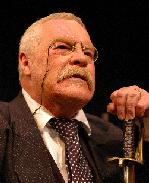SITE GUIDE
SEARCH
REVIEWS
REVIEW ARCHIVES
ADVERTISING AT CURTAINUP
FEATURES
NEWS
Etcetera and
Short Term Listings
LISTINGS
Broadway
Off-Broadway
NYC Restaurants
BOOKS and CDs
OTHER PLACES
Berkshires
London
California
New Jersey
DC
Philadelphia
Elsewhere
QUOTES
TKTS
PLAYWRIGHTS' ALBUMS
LETTERS TO EDITOR
FILM
LINKS
MISCELLANEOUS
Free Updates
Masthead
A CurtainUp Review
The Bully Pulpit
|
I make a habit of speaking plain and at times rather blunt English. Perhaps that's why throughout my political career many of my critics have accused me of being more a preacher than a politician! — Theodore Roosevelt.
|

Michael S. Smith in The Bully Pulpit
(Photo: Rick Teller) |
For most of the two-hour show Roosevelt is not on the pulpit or making speeches. He is in his Sagamore Hill home, a home that is filled with mementoes of his years as a rancher, hunter, Rough Rider, naturalist and president. The time is 1918, on Roosevelt's 60th birthday. He has been out of office for ten years.
Only occasionally does Roosevelt get behind a railing, upstage between the windows, to make one of his fiery speeches. Most of the time, he jokes, remembers, explains and admonishes. Director Bryan Stevens keeps Smith busy pouring tea, donning Rough Rider cap and safari helmet, brandishing a whip, taking aim with his rifle and shooting a bull's eye.
Unfortunately, Theodore Roosevelt lived before the era of television or movies. But Smith is certainly everything one expects of the robust and opinionated 26th president whose most famous expression was "Speak softly, but carry a big stick." Most striking, with his pince-nez and walrus mustache, Smith looks so much like Roosevelt it's hard not to gasp as he marches on stage to "set the record straight, face the facts and face the music."
Although Roosevelt admits there are certain parts of his life he'd rather not think about, he is always honest, never apologetic. The Bully Pulpit covers all the major events in Roosevelt's life: from his childhood, when he had to sleep sitting up because of his asthma; to his two wives, Alice who died in childbirth, and Edith, his childhood sweetheart whom he married two years later; and his five children, one of whom (Quentin) he lost when he was killed in World War II, another of whom (Alice) he almost lost through early abandonment and later estrangement.
The play is most interesting when it recounts Roosevelt's adventures as a Rough Rider charging up San Juan Hill, learning to be a rancher out West, or campaigning for a cause or an election. But it is most beguiling when Roosevelt makes his wry comments on the people and events in his life. William McKinley "had the backbone of a chocolate éclair." Woodrow Wilson is "Puddin' head, Wooden head Woodrow Wilson." Franklin Delano Roosevelt is "my 5th cousin from the Hyde Park feather duster side of the family." And on the Panama Canal — i"t is said that I started a revolution in Panama. Panama was always having revolutions every five minutes for fifty years."
Roosevelt offers opinions both political and personal. "Politicians and diapers should be changed frequently. And for the same reasons." "You can never begin to live until you dare to die." "The worst of all fears is the fear of living."
Smith portrays Roosevelt as a man not above telling a corny joke or offering silver dollars to members of the audience who shout out the right answers when he pauses in a recollection. Nor does he let Roosevelt maintain his confident mask without on occasion showing the pain and regrets even the most self-assured and self-righteous of man cannot avoid. The sorrow Roosevelt feels at the death of his "baby boy" is palpable.
Towards the end of the play, Smith recites a list of accomplishments not everyone may be aware of. But The Bully Pulpit is more than informative. It is also entertaining and highly theatrical. In other words, you don't have to be a history buff to enjoy this tasty slice of history.
|
THE BULLY PULPIT Written and Performed by Michael O. Smith Directed by Byam Stevens Scenic Design: Charles Corcoran Lighting Design: Jill Nagle Properties Design: Mary Robinette Kowal Sound Design: Tom Shread Running Time: 2 hours with one 10 minute intermission Presented by South Ark Stage Company Beckett Theatre, 410 West 42nd Street From 4/29/08, opening 5/14/08; closing 6/29/08 Tuesday at 7pm, Wednesday — Saturday at 8pm, Saturday matinee at 2pm, Sunday matinee at 3pm Tickets: $45 (212) 279-4200 or TicketCentral.com Reviewed by Paulanne Simmons May 12, 2008 |
|
REVIEW FEEDBACK Highlight one of the responses below and click "copy" or"CTRL+C"
Paste the highlighted text into the subject line (CTRL+ V): Feel free to add detailed comments in the body of the email. |
Try onlineseats.com for great seats to
Wicked
Jersey Boys
The Little Mermaid
Lion King
Shrek The Musical

Leonard Maltin's 2008 Movie Guide


Wicked
Jersey Boys
The Little Mermaid
Lion King
Shrek The Musical

Leonard Maltin's 2008 Movie Guide


